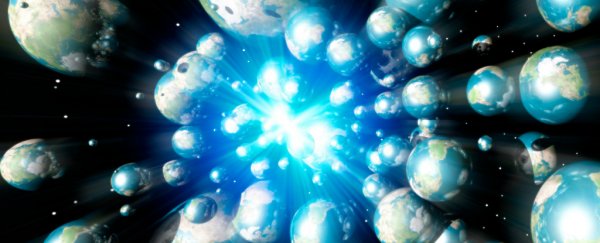Thanks to advances in technology and science, we know a lot more about our Universe today than we did a century ago. But what if we're only looking at part of the picture? There are several hypotheses in physics that suggest our Universe exists alongside multiple others, nearly identical to our own, that we can't detect.
But according to theoretical physicist and bestselling author Brian Greene from Columbia University, there are ways we would be able to tell whether our Universe is just one of many. And it has some pretty interesting implications for the notion of free will.
"There are certain versions of the multiverse that, should they be correct, might be most susceptible to confirmation," Greene told Tanya Lewis over at Live Science.
First of all, we'd have to know what type of multiverse we're living in. The two main suggestions come from quantum mechanics and string theory, but the multiverse of quantum mechanics only exists mathematically, which makes string theory a better candidate for testing.
The general aim of string theory is to create a unified 'theory of everything' based on the assumption that all matter in the Universe is made up of tiny dancing 'strings' hidden deep within quarks, which control the type of matter created by the pattern of their vibrations.
String theory is great because it could unify quantum mechanics and gravity, but to work mathematically, there must be 10 physical dimensions hidden away somewhere, as opposed to the four that we see right now. This also means that there could be a huge number of different universes tucked away too, each with varying physical laws, such as different electron masses and constants of gravity.
Or as Greene puts it: "If the Universe is a loaf of bread, everything we know about takes place on one slice."
So how would we know if we were living alongside these other multiverses? Well, in the case of string theory, crumbs could migrate off our slice of bread onto another one as a result of collisions, and we might be able to detect their missing energy signatures using particle accelerators like the Large Hadron Collider at CERN.
An alternate hypothesis is inflation, which suggests that our Universe expanded rapidly like a bubble in the first fractions of a second after the Big Bang, and that other universes may have done the same after many other big bangs.
In this case, our bubble would be floating alongside other bubbles in a cosmic sea, and that means they would interact. "Indeed, they inevitably must collide, leaving possible signatures in the cosmic sky which we can try to search for," writes Eugene Lim, a theoretical and particle physicists from King's College London in the UK.
Researchers are now searching for any traces of these signatures – which could be voids or hot or cold patches – in the cosmic microwave background left over from the Big Bang. And earlier this week a cosmologist found evidence of what might be one of these signatures. So what would it mean for humanity if it is?
As Greene explains, the existence of infinite multiple universes would guarantee there would be at least one other you out there coming across at least one other version of this article. One version of you might decide to read it while another might not, which kind of messes with the concept of free will.
But don't worry, because according to Greene, free will doesn't exist anyway as it's just a human sensation and not a particle that physics can describe.
"When I move my teapot, that sensation is absolutely real," says Greene. "But that's all it is. It's a sensation."
So the bottom line is that we might one day be able to detect evidence of parallel universes using high-tech experiments… but whether we do or we don't doesn't really matter. Still, regardless of whether it's nothing more than a sensation, we think it would be amazingly cool to know that we're not the only lonely universe out there.
Brian Greene is doing his first Australian tour in March 2016 and ScienceAlert is a promotional partner. Watch him live to find out more about string theory, free will, and the quest for a theory of everything.
